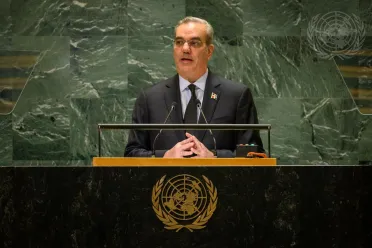Statement
Statement summary
LUIS RODOLFO ABINADER CORONA, President of the Dominican Republic, said the Summit of the Future stressed the need to bolster international financing to achieve the SDGs, adding that his country has made considerable headway in poverty reduction, food security, energy sustainability, public safety and climate action. “Monetary poverty shrank from 25.8 per cent in 2019 to 23 per cent in 2023, despite the pandemic and the effects of war, and in the first half of this year, it fell to 18.9 per cent, which is the lowest level in our history,” he underscored, spotlighting the construction of 2,000 new megawatts of thermal generation and the signed contracts for 1,600 megawatts of renewable energy that will lead, by the end of 2027, to a generation surplus of over 15 per cent. “In 2022, the murder rate in our country stood at 13.2 for every 100,000 inhabitants; in 2023, it fell to 11.5, and so far in 2024, it stands at 9.9 — this figure is below the average for Latin America and the Caribbean, which according to the United Nations data is 17.2,” he noted.
Turning to a widespread consensus on the urgent need for a new model of global governance, he said his country is committed to an effective and renewed multilateralism. “Without concerted principles-based action, the foundations of the international community will continue to erode,” he stressed, adding that democracies rarely go into war against others. “We stand at a crucial junction for democracy in Latin America and the Caribbean,” he went on to say, referring to the Latinobarómetro poll, according to which support for democracy has fallen significantly between 2010 and 2023, while support for authoritarianism increased, as citizens do not see the tangible benefits of democracy and show great concern about personalism and corruption, undermining trust in democratic institutions.
In Latin America, he continued, indefinite re-election over the last 30 years has eroded democracy. “One example of this is the crisis in Venezuela, which combines a concentration of power, persecution of the opposition and censorship of the media,” he said, adding that without the transparency of the electoral process and without necessary documentation, the crisis will further worsen. “We continue to insist on the publication of all electoral records and their verification by impartial institutions and respect for the results of the popular will in Venezuela,” he stressed, pointing out that without this publication, a legitimate winner cannot be declared. Recalling that on 19 May the Dominican people re-elected him for a second and final presidential term, he said he had recently presented a constitutional reform to limit presidential re-elections to two consecutive terms.
Speaking about the crisis in Haiti, he underscored that the instability in the neighbouring country has put significant pressure on security. In 2023, medical care for Haitian immigrants represented 9.9 per cent of the total appointments in the health system, while of 200,000 foreign minors in the Dominican public education system, 147,906 are estimated to be of Haitian origin, he said. “These figures reflect the supportive commitment shown by the Dominican Republic, but we cannot do it alone,” he stressed, also thanking Kenya for the majority of the personnel supporting the Haitian National Police; the United States, which has borne the greatest financial and logistical burden; Jamaica, the Bahamas and El Salvador, which have already sent their contributions; and CARICOM for its efforts in Haiti. Still, only 400 troops have been deployed in Haiti, with a minimum of 1,000 required for the force to be effective, he observed..
Across the Atlantic Ocean, in the Caribbean Sea, the climate crisis remains a shared battle.
Luis Rodolfo Abinader Corona, President of the Dominican Republic, highlighted the “triple planetary crisis” – three key interlinked challenges confronting humanity: climate change, biodiversity loss and pollution.
He stressed his country’s commitment to helping establish the fund loss and damage and achieving the 30x30 goal in protecting our maritime territory.
That initiative aims to have 30 per cent of the world’s land, inland waters and oceans under protection by 2030.
Full statement
Read the full statement, in PDF format.
Photo

Previous sessions
Access the statements from previous sessions.
